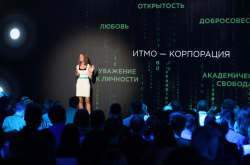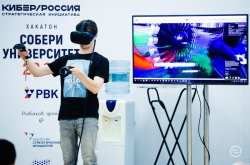“Island 10-21” is the first Russian educational project for intensive training of personnel for the digital economy and the National Technological Initiative. The project will take place this July at FEFU campus on Russky Island. It is an experiment, as the organizers bring together the most motivated people of different ages. 1000 technological entrepreneurs, data analysts, engineers, students, talented pupils, regional and federal officials will participate in the project. Specialists in the skills necessary for digital economy development will become teachers and mentors of the trainees. The participants will learn to work with digital and end-to-end technologies as well as acquire skills of personal and team management. These skills, technologies and ways to apply them will turn the trainees into desirable employees for technological companies, state corporations, large industrial enterprises, and regional and federal management project teams. They will also be able to create and develop their own technological projects.
“Today the demand is high for specialists in rapidly emerging professions, that the current education system and labor market cannot prepare for. In Russia and globally there is a shortage of specialists in areas where usual engineer or programmer knowledge does not suffice. Some of those areas are big data, end-to-end technologies (computer analysis and modelling), blockchain technologies, AI, IoT. It requires an understanding of the new tasks that arise at the intersection of technology, the humanities and natural sciences. Traditional training provides interesting but sad results. According to our forecasts, developing and implementing a relevant educational program will take from six to eight years. The problem is that during this time the profession changes by more than 80%. When the first wave of graduates reaches the labor market, their knowledge will be outdated. We fall into a trap where the usual training methods do not apply and we need something fundamentally new”, says Dmitry Peskov, head of the “Young Professionals” direction of the Agency for Strategic Initiatives.

We need to implement several steps to develop these new approaches, according to the expert. The first step is to avoid mediators: the professionals must do the training directly. The organizers of “Island 10-21” want to determine who can get the skills and how to motivate them. According to Dmitry Peskov, it is necessary to know a lot about project participants, mostly about their motivation and attention management – the skills that are often considered untrainable.
The project will be a challenge for everyone. The participants will get at least ten hours of uninterrupted intensive training a day and presumably about only four hours of sleep. Additionally, the organizers will collect data on how the trainees solve problems, when their pulse rises and what feedback they receive from other participants as well as many other factors, which will help to provide everyone with the exact skills they need. In other words, all the choices, steps and activities made by the participants will form their digital footprint, a proof of acquired skills. Every achievement will be recorded and, if desired so by the participant, made accessible to the most prestigious employers and technological teams of the country.
“A strategy of NTI development involves a matrix, the third dimension of which is responsible for working with talents and training specialists. This makes this initiative a part of a global “University of NTI “20.35” project that assembles every technological and content educational solution and looks for ways to reformat and update them. This project is also a way to quickly deliver the results both to those who know what they want and to those who could potentially be interested in it. In this sense, “Island 10-21” is an independent project, which can be considered an attempt to create a new tool for rapid personnel training. When we started to working with new markets, we realized that they needed people with new skills not taught at universities. People are forced to self-study, but there is no surplus of new specialists”, explained Alexander Povalko, General Director, Chairman of the Management Board of RVC JSC.
However, the participants will not only gain new skills on Russky Island. The project will also enable them to manage their career. According to Dmitry Peskov, the organizers will select candidates for positions in the government, various research institutions and technological start-ups and provide them with career prospects. The participants will decide how to use the acquired skills themselves.

“One focus of the programme is developing a way of transforming state administration into data management. I believe one of the most significant tasks of the coming years is transforming the analytical function of the state and by trial and error moving from administration to data management. During “Island 10-21” we will try to develop our first draft based on the data from Russky Island, Vladivostok, Primorsky Krai and the whole Far East region,” said Vladimir Solodov, deputy envoy from the President of the Russian Federation in the Far Eastern Federal District.
One of the technologies to be applied on “Island 10-21” is a digital footprint and a digital profile (a digital equivalent of a traditional diploma or certificate). A digital footprint is a confirmation of possessing the skills necessary for working in a digital economy, that the project participants will receive after 10 days of training.
““Island 10-21” is a start of an infinite path of professional development. Having collected all of the data about themselves, having understood what we can do and what we have yet to master, the participants will follow this path and the “University 2035” will provide them with opportunities to grow both on- and offline. On Russky Island, within the training framework the participants will be accumulating skills and instantaneously using them in practice in various activities. The benefit they get will stay with them forever: they will be easy to find, it will be easy for them to get employed and to interact with each other in the future,” says Vasiliy Tretyakov, head of the ”University of NTI” project division.
Digital data is collected already during candidate selection and now the first candidates take different tests, polls and play games that will determine their motivation, personal qualities and competence. Every participant will get their own educational track to acquire the skills they desire. The selection will be based on AI algorithm that will compare the candidate’s skills to those of other leaders taking part in the training. Similarly, the algorithm will choose the teachers. Despite the fact that the organizers have already invited representatives of leading technology companies, universities and entrepreneurs, there will be an open selection for every professional willing to take part in the project.
Any Russian citizen can take the test. After two-hour testing in a play-form (one has to answer questions of a chat-bot) each participant will get personal recommendations for further development like, for example, online courses and textbooks to use to fill the gaps of knowledge. The service is free of charge for everyone until May 12th. If the test shows you only have talents in one area, do not despair: you might still participate as the organizers are interested in those who can professionally deal with communication, data, emotional intelligence and other areas.
“Digital economy has arrived and we are training professionals to work in it. This means that we, the universities, did not foresee that we had to teach them earlier. This is a great challenge for the entire university community. We, as a classical university, are trying to meet the challenge that has been set before us. For example, FEFU has become one of the NTI centers for neuro-technology, virtual and augmented realities, and the capacity of these laboratories will be fully utilized during the training process. There are Olympic athletes and there are amateurs. I believe, this project is on the Olympic athlete scale as we are training the leaders of the future. If we do not react right now, if we do not develop educational programs relevant for digital economy and create a culture of life in a digital age, we will not be able to form the future. The most important aspect is cooperation between all of the universities participating in the NTI project,” says rector of the Far Eastern Federal University, Nikita Anisimov.
There are many different educational formats on “Island 10-21”. Here are some of them:
"X-labs" are laboratories that allow individuals or teams to solve problems in the field of end-to-end technologies (big data, AI, blockchain technology, new and portable energy sources, new production technologies, wireless technologies, neuro-technologies and augmented reality, sensory and robotics elements).
"Digital GTO" are short intensive courses that will allow one to quickly understand and apply digital tools.
"Thinking Clubs" are a technology of system thinking, inventing, designing and forecasting the future, modelling and working with projects.

"Working with global markets" are classes by creators of popular products; levelling up one’s business skills and cross-cultural communication experience.
How can I participate?
Leave an application and take the test on the site (link in Russian). The first stage will last until May, 12, you can take the tests in any order. The winners of the first stage will pass to the second one, which will determine the ultimate winners. It will take place from 15th to 26th May. After the 1000 winners are announced they will receive an invitation and will start preliminary preparation for their intensive course on Russky Island this July.
Translated by Pavel Vorobyev



